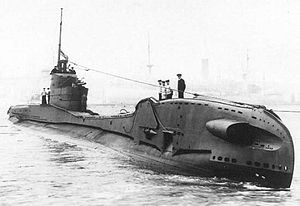Difference between revisions of "Submarine Program of Reykanes"
LeotropolisG (talk | contribs) |
LeotropolisG (talk | contribs) |
||
| Line 13: | Line 13: | ||
==Completed Submarines== | ==Completed Submarines== | ||
===K-1-class=== | ===K-1-class=== | ||
| + | [[File:SM U-27 (Austria-Hungary).jpg|thumb|right|The lead boat of the K-1 class of submarines, K-2, is seen here at her launch on 19 November 1951.]] | ||
{{main|K-1-class submarine}} | {{main|K-1-class submarine}} | ||
{{div col|colwidth=7em}} | {{div col|colwidth=7em}} | ||
Revision as of 14:53, 25 October 2024

Submarine Program of Reykanes (Reykani: Kafbátaáætlun Reykjaness) was a policy and a armament program to establish and expand the Reykani Navy with a submarine fleet ordered by Kári Jónsson in late 1951, carried out by the Reykani Socialist Republic between 1951-1958 and then by the Republic of Reykanes from 1958 till 1960. The fleet was meant to challenge the nearby naval powers and conduct secret operations, and was to be completed by 1960. The term K-bátur (shortened version of Kafbátur, submarine or diving boat in Jackian) became popular during this period and became the term used for Reykani submarines.
Development of the plan began in early 1951. The production largely started as a covert operation, mainly carried out in hidden naval bases around Reykanes but was open and was massively expanded after 1953, mainly for propaganda for the state.

Prior 1950 the Reykani Navy didn't even exist, It was established on 12 April 1950 and consisted of primarily of tug boats and fishing boats retrofitted with military hardware and some outdated river monitors, like the SRF Verkalýðsstétt. The Navy was in dire need of expansion and upgrade. The Post-revolution Reykani Navy was conflicted on, which direction in future construction should it take, multiple views arised, on whether were to take the navy. The Primary aim is to stop any invasion before it reached land. The navy was devided between the views of Sæbjartur Bergmannsson and Friðbert Stefansson. The first advocating for program to focus on newer heavy cruisers and similair type of ships as main vessels for the navy, primarily centered around them, the latter focused on submarine warfare, primarily building submarines to support the navy, effectively promoting lighter and faster ships, focusing on stealth and quick attacks.
Eventually Kári Jónsson was convinced by Friðbert Stefansson, who eventually became the commander of the Reykani Navy in 1953 and the submarine program ws included in the Four Year program between 1950-1954, that had the aim of building up Reykanes after years of colonisation and the the wars during 1949. The Trans-Islandic Railway was tasked to build the submarines and and other vessels, the 12 April Shipworks, a subsidiary of TEJ was created to fulfill the requirements.